Photographs: Pradeep Bandekar Patcy N in Mumbai
British television producer Nasreen Munni Kabir has made quite a few documentaries on Indian cinema like Movie Mahal, In Search Of Guru Dutt, How to Make it Big in Bollywood and The Inner and Outer World of Shah Rukh Khan.
Her most recent work is the first official biography of A R Rahman, called A R Rahman: The Spirit of Music.
The book captures the star composer's life before and after his international stardom, and is quite a good read. Check out the excerpt for a taste.
Kabir talked about Rahman and her work in an e-mail interview with Patcy N.
What made you write a book on Rahman?
I have tried to record the work of some of Indian cinema's history-makers. So many years ago, I managed to write a biography on Guru Dutt, a book of conversations with Javed Akhtar and Lata Mangeshkar. Of course, there are other important history-makers too and these have been written on.
Rahman is known to be a very shy and reserved person. How did you make him open up?
I think it's a question of time. We first discussed the idea of the book eight years ago and the actual work started three years ago. It was a slow but rewarding process. Because there was time I could talk to AR when he was free to talk, free of his deadlines and pressures of work. I also feel we built a sense of trust and I hope (modestly) that I asked him questions that helped to make him feel like opening up. But time was the greatest factor.
'Winning the Oscars gave Rahman a tremendous amount of confidence'
Image: Cover of the book A R Rahman The Spirit of MusicYou met him a few times and spoke to him over video conferencing. Tell us about those meetings.
Skyping is a wonderful way of talking because you can talk for snatches of time that are spontaneous, there is no travelling to AR and back and he finds pockets of time when he's free.
Working with him is an adventure. He is a free spirit and sometimes when we would meet to talk about the work, we would sometimes decide not to work but go for a biryani or if he was in London we'd go for a walk in Regent's Park.
During the four years that you had known Rahman, he had bagged an Oscar award. Did that change him as a person?
Winning the Oscars gave him a tremendous amount of confidence. Remember that the Oscars are voted by film folk and being recognised by the international film community is a great achievement. They don't give out awards lightly. And the choice of who gets the Oscar is entirely based on whether that soundtrack works for that film and lifts it in a musical way.
The core person, the values that AR has have remained the same, but people do change. They must otherwise how do they grow?
'I had to see the films and talk to people who worked with AR'
Image: Rahman and his wife SairaPhotographs: Pradeep Bandekar
To interview any subject, you have to carry out research on that person. What kind of research went into this book?
You need to research AR's music and see the range of his work. And see how story-telling in Indian cinema has evolved and so the music has to match the mood of the films. I had to see the films and talk to people who worked with AR.
Why do you always prefer conversation and not narrative style in your writing?
I like the idea that we maintain, the 'voice' of the subject. I mean I could get him to tell me everything and then write it up in my own words, as if I was there. But I wasn't.
I like primary research and people speaking in their own words, from their own experience. That does not mean narrative biographies aren't needed, yes they are. But considering how busy AR is, this was a good format.
I am sure other books will be written on him and they will take other routes. I always think if only there were long in-depth interviews with filmmakers like Bimal Roy, Mehboob Khan and Guru Dutt, how much we would have learned about their thinking! You could sit in your room and imagine how I work, but isn't it good to have me tell you in my own words?
'Perhaps it is my failing that I did not delve more into his personal life'
Image: Rahman's sister Raihanah and mother KareemaThe book talks about Rahman's music in depth but not so much about his personal life. There is not much about his mother whom he considers his guide, or about his wife Saira.
We did speak about his mother and the belief she has always had in AR. And the early years of his life, where he was born, the kind of house he lived in. As there is already a lot written on his great respect for his mother, I wasn't sure we could add anything new to say on that.
We also talked about how he met Saira and something about his family life. Perhaps it is my failing that I did not delve more into his personal life, into his relationships with his sisters etc. But perhaps that's for the next writer on AR to build on. I was keen to record his thinking on music and how he composes.
Rahman's answers are mostly connected to spirituality.
He is very spiritual. This means he also does not think that he is in control of everything. He believes music comes through him rather than from him. He is God-fearing and respectful of all religions. His spirituality also shows in his hope and belief that things will turn out well in the long run. It gives him a positive outlook on life.
'It's a nice idea to have the best Hindi film dialogue in book form'
Image: Rahman with his OscarsPhotographs: Babu / Reuters
What are you writing next?
A book on film dialogue, which is the fifth in the series titled: The Dialogue of Devdas, Bimal Roy's Immortal Classic. It will feature the complete dialogue and songs of the film in Hindi, Urdu, Romanised Hindi and an English translation. It will also have forewords by Bimal Roy's family and an extension commentary on the film. This book is slated for release next March.
There are countless international theatre plays that you can find in book form, so it's a nice idea to have the best Hindi film dialogue too.
The series started with Mughal-e-Azam, followed by Awaara, Mother India and most recently Pyaasa. These dialogue books may not fly off the shelves, they aren't big sellers but I believe they are an important way of recording the best dialogue in Hindi/Urdu films for future students of cinema. It's another way of legitimising Hindi film as an art form.

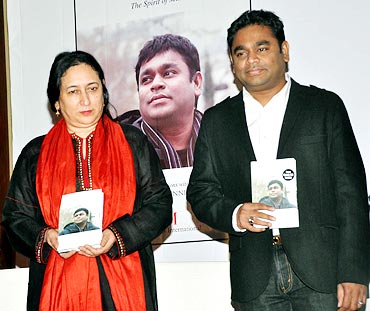
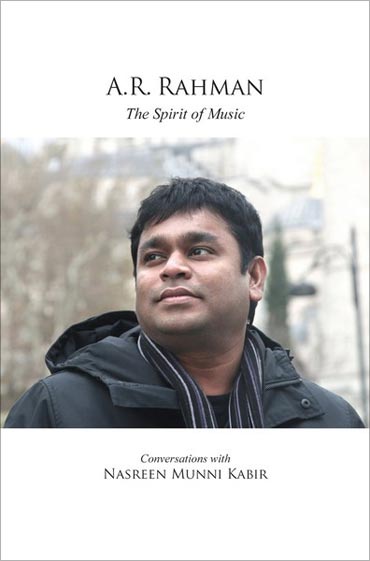
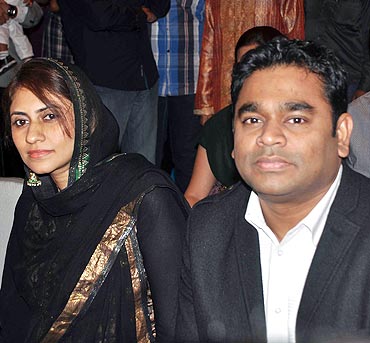
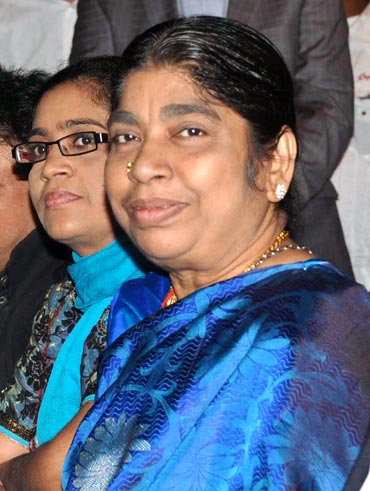
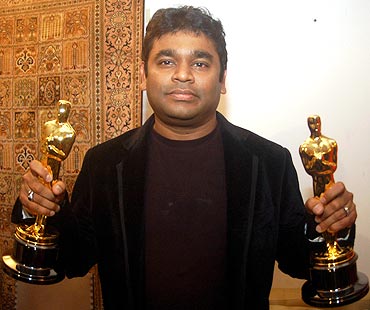
Comment
article